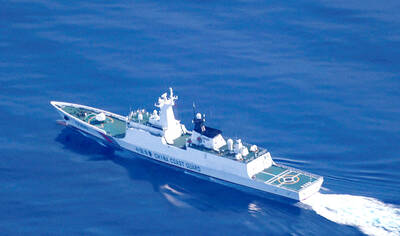Libya appeared at odds with Sudan and Egypt on Friday over the whereabouts of 11 European tourists and eight Egyptians kidnapped a week ago in a desert area of southwest Egypt.
“With research operations now finished, we can confirm that the hostages and their abductors are not in Libya,” a senior Libyan official said on condition of anonymity.
Both Egyptian and Sudanese officials said earlier on Friday that the hostages were now in Libya.
“The kidnappers took them across the Libyan frontier by vehicle. They are still there, according to our contacts,” said Ali Yousuf, head of protocol at the Sudanese foreign ministry.
“We are watching the region closely and Sudan is doing everything possible to help the efforts to ensure their liberation,” he added.
Taken hostage on Sept. 19 during a off-road vehicle safari, the hostages were first moved to Sudan by their kidnappers, whose nationality is unknown.
Sudan said on Thursday that the group had been transferred to Libya, about 15km from the border in the Jebel Uweinat region.
Jebel Uweinat is a 1,900m plateau roughly 30km in diameter near where Sudan, Egypt and Libya meet.
“They are still in Libya. We have no other news,” an Egyptian security official said earlier on condition of anonymity.
The hostages are 11 tourists — five Italians, five Germans and one Romanian — plus eight Egyptians — two guides, four drivers, a border guard and the organiser of the safari.
The kidnappers have demanded that Germany take charge of payment of an US$8.8 million) ransom, an Egyptian security official said on Thursday.

‘HYANGDO’: A South Korean lawmaker said there was no credible evidence to support rumors that Kim Jong-un has a son with a disability or who is studying abroad South Korea’s spy agency yesterday said that North Korean leader Kim Jong-un’s daughter, Kim Ju-ae, who last week accompanied him on a high-profile visit to Beijing, is understood to be his recognized successor. The teenager drew global attention when she made her first official overseas trip with her father, as he met with Chinese President Xi Jinping (習近平) and Russian President Vladimir Putin. Analysts have long seen her as Kim’s likely successor, although some have suggested she has an older brother who is being secretly groomed as the next leader. The South Korean National Intelligence Service (NIS) “assesses that she [Kim Ju-ae]

In the week before his fatal shooting, right-wing US political activist Charlie Kirk cheered the boom of conservative young men in South Korea and warned about a “globalist menace” in Tokyo on his first speaking tour of Asia. Kirk, 31, who helped amplify US President Donald Trump’s agenda to young voters with often inflammatory rhetoric focused on issues such as gender and immigration, was shot in the neck on Wednesday at a speaking event at a Utah university. In Seoul on Friday last week, he spoke about how he “brought Trump to victory,” while addressing Build Up Korea 2025, a conservative conference

China has approved the creation of a national nature reserve at the disputed Scarborough Shoal (Huangyan Island, 黃岩島), claimed by Taiwan and the Philippines, the government said yesterday, as Beijing moves to reinforce its territorial claims in the contested region. A notice posted online by the Chinese State Council said that details about the area and size of the project would be released separately by the Chinese National Forestry and Grassland Administration. “The building of the Huangyan Island National Nature Reserve is an important guarantee for maintaining the diversity, stability and sustainability of the natural ecosystem of Huangyan Island,” the notice said. Scarborough

DEADLOCK: Putin has vowed to continue fighting unless Ukraine cedes more land, while talks have been paused with no immediate results expected, the Kremlin said Russia on Friday said that peace talks with Kyiv were on “pause” as Ukrainian President Volodymyr Zelenskiy warned that Russian President Vladimir Putin still wanted to capture the whole of Ukraine. Meanwhile, US President Donald Trump said that he was running out of patience with Putin, and the NATO alliance said it would bolster its eastern front after Russian drones were shot down in Polish airspace this week. The latest blow to faltering diplomacy came as Russia’s army staged major military drills with its key ally Belarus. Despite Trump forcing the warring sides to hold direct talks and hosting Putin in Alaska, there